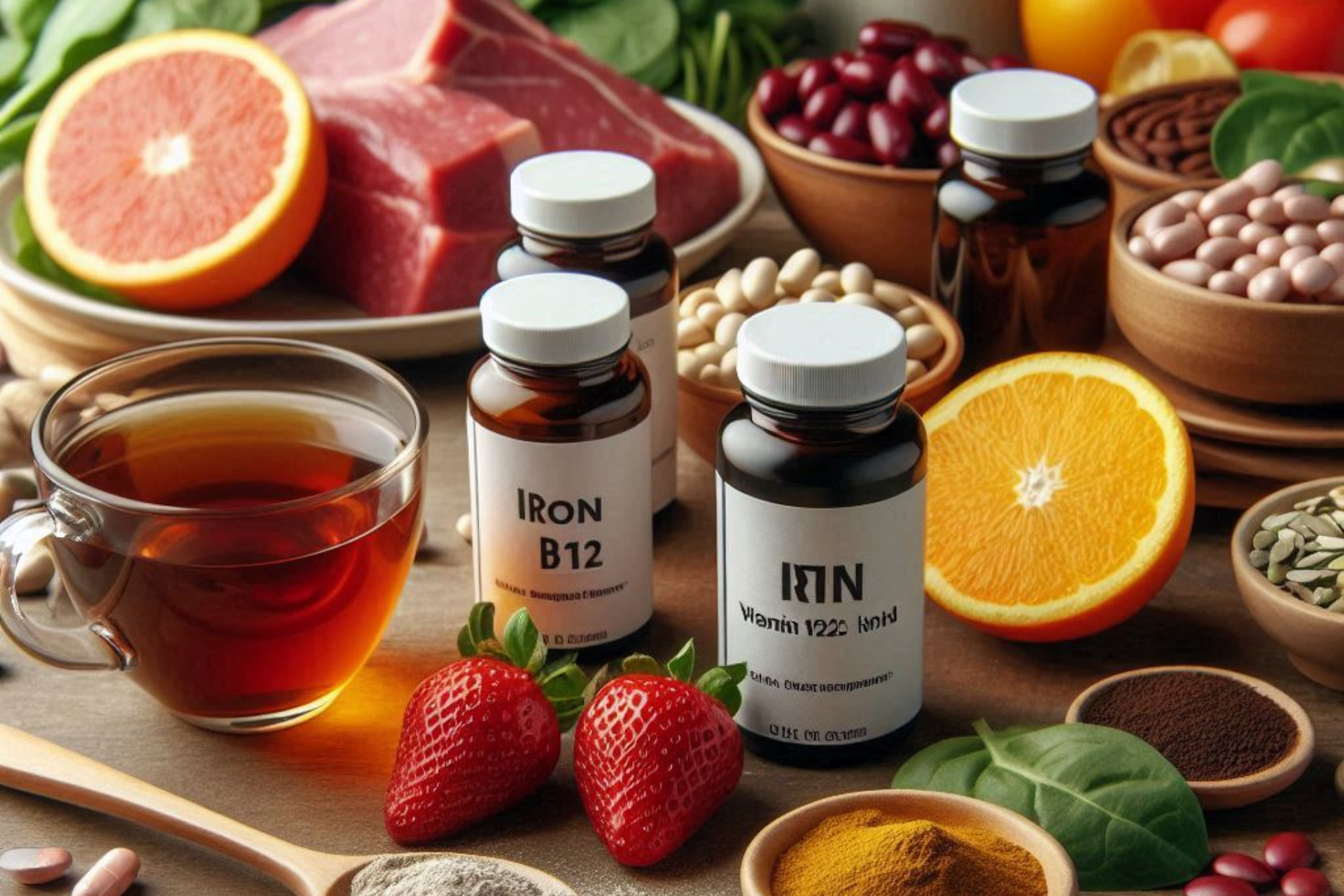Introduction
Did you know that anemia not only affects your energy but can also change your mood and even your ability to think clearly? Many people know the common symptoms of anemia, such as fatigue and paleness, but the impact of this condition can go much deeper. Supplements are not just a quick fix; they are powerful allies in treating anemia, often in ways you wouldn’t imagine. Let’s explore the supplements that fight anemia in a deeper way, covering how to choose the best ones, secret dosages, recipes you probably haven’t heard of, and the surprising science behind the treatment.
H1: The Crucial Role of Supplements in Fighting Anemia
Treating anemia is not just about taking an iron or vitamin supplement. There are different types of anemia, and each requires a specific supplement. The most interesting thing is that, in some cases, supplements can actually speed up the recovery process, but with a secret: the way you take them and the correct combination makes all the difference!
H2: Which Supplements Are Really Effective in Treating Anemia?
Here’s what doctors usually don’t talk about when it comes to anemia supplements. Did you know that certain supplements can be much more effective if combined strategically? This goes beyond simple supplementation and into the realm of nutritional synergy!
H3: Iron: The Unsung Hero of Anemia
Iron is one of the most discussed nutrients when it comes to anemia, but what many don’t know is that the type of iron you choose can make all the difference. There are two forms of iron: heme iron (found in meats) and non-heme iron (found in vegetables and supplements). Heme iron is more easily absorbed by the body, but non-heme iron, when consumed with vitamin C, can be as effective as animal-based iron.
- Recommended dosage: 18 mg for adult women (20 mg for pregnant women), but in cases of severe deficiency, doctors may recommend up to 200 mg per day.
- Secret tip: Did you know that drinking coffee or tea right after taking iron can reduce its absorption by up to 70%? Avoid these drinks for at least an hour after taking iron!
H3: Vitamin B12: The Supplement That Goes Beyond Anemia
Vitamin B12 is famous for being essential for red blood cell health, but a deficiency can affect much more than that. It can influence cognitive function, mental health, and even energy production in cells. What’s intriguing is that, in some people, a lack of B12 can cause depression symptoms, which are often confused with the effects of anemia itself.
- Recommended dosage: 2.4 mcg per day, but in cases of deficiency, higher doses of up to 1000 mcg may be needed.
- Secret tip: Sublingual B12 (the one that dissolves under the tongue) has much more efficient absorption than traditional pills!
H3: Folic Acid: The Guardian of Red Blood Cell Production
Folic acid (or vitamin B9) is essential for producing new red blood cells, but few know that it also plays a crucial role in boosting fertility. Women with folic acid deficiency not only face anemia but also have an increased risk of pregnancy complications, such as neural tube defects.
- Recommended dosage: 400 mcg per day for adults, but pregnant women should consume up to 600 mcg.
- Curious fact: Did you know that folic acid deficiency can worsen depression? This happens because folic acid has a direct effect on the neurotransmitters that regulate mood.
H2: How to Take Supplements Correctly?
Taking supplements the right way is much more than just swallowing a pill. Strategy can transform the treatment and speed up recovery. But did you know that timing and method of ingestion make all the difference?
H3: The Perfect Combination: Iron and Vitamin C
Non-heme iron, found in vegetables and supplements, can be much more effective when combined with vitamin C. But the secret is that it’s not enough to just drink a glass of orange juice! Studies show that consuming foods rich in vitamin C, such as strawberries, peppers, and tomatoes, 30 minutes before or after taking the supplement can increase iron absorption by up to 300%.
H3: Avoid Certain Foods to Maximize Benefits
While iron is absorbed better without the presence of calcium, vitamin B12 is most effective when there is no interference from foods high in phytic acid (such as whole grains and seeds). Did you know that fortified cereal with iron, when consumed with milk, can decrease iron absorption by up to 50%? Yes, milk’s calcium interferes directly with iron’s effectiveness!
H2: Homemade Recipes to Help with Anemia Treatment: What You’ve Never Heard Of
In addition to supplements, food is a powerful ally in fighting anemia. There are homemade recipes that can help improve iron absorption and other essential vitamins in a tasty and effective way.
H3: Energizing Beetroot and Turmeric Juice
Beetroot is a superfood for those suffering from anemia, and when combined with turmeric, it can enhance iron absorption while also reducing inflammation in the body.
Recipe:
- 1 raw beetroot
- 1 piece of fresh turmeric
- Juice of 1 orange
- 1 carrot
- 1 teaspoon of honey
Blend everything together and drink immediately! Turmeric also has antioxidant and anti-inflammatory properties that help with cellular regeneration.
H3: Detox Spinach, Black Bean, and Orange Soup
The combination of spinach, rich in iron, and black beans, which contain folic acid, is an excellent option for those seeking a complete and nutritious dish.
Recipe:
- 2 cups fresh spinach
- 1 cup cooked black beans
- Juice of 1 orange (for iron absorption)
- 1 red onion, 2 garlic cloves
- Seasonings to taste (pepper, olive oil, salt)
Sauté the onion and garlic, add the spinach, beans, and orange juice. Cook until the spinach wilts and serve hot. The orange helps increase iron absorption!
H2: Frequently Asked Questions (FAQs)
H3: How long does it take for iron supplements to take effect?
Typically, you’ll start noticing an improvement in your energy within 1 to 2 weeks of starting iron supplements, but the full effects may take anywhere from 1 to 3 months.
H3: Can I take iron supplements with other medications?
In some cases, iron supplements can interfere with the absorption of other medications, like antibiotics. Therefore, it’s important to consult your doctor before starting any supplement, especially if you’re on other medications.
H3: Do folic acid supplements help in cases of iron-deficiency anemia?
Yes, combining iron and folic acid can be extremely beneficial since both play vital roles in red blood cell production. However, each type of anemia requires specific treatment, and combining these supplements may be indicated after medical evaluation.
Conclusion
Supplements can be the key to treating anemia, but the correct combination, ideal dosage, and method of ingestion are essential for maximizing benefits. Additionally, adopting a balanced diet with foods rich in iron, vitamin B12, and folic acid, and including nutritious homemade recipes, can accelerate the recovery process. Anemia doesn’t have to be a constant issue in your life. With the right knowledge and supplementation strategies, you can quickly improve your health and quality of life.
Read About Anemia at ajsutersavie.com
Read More About Anemia at juliocemar.com

